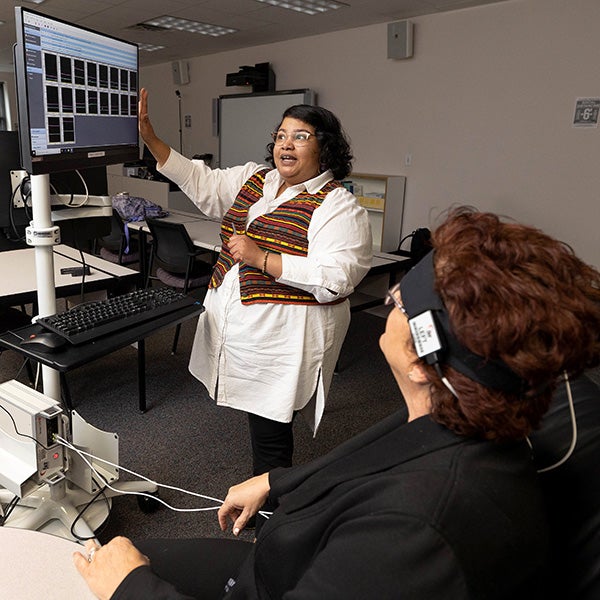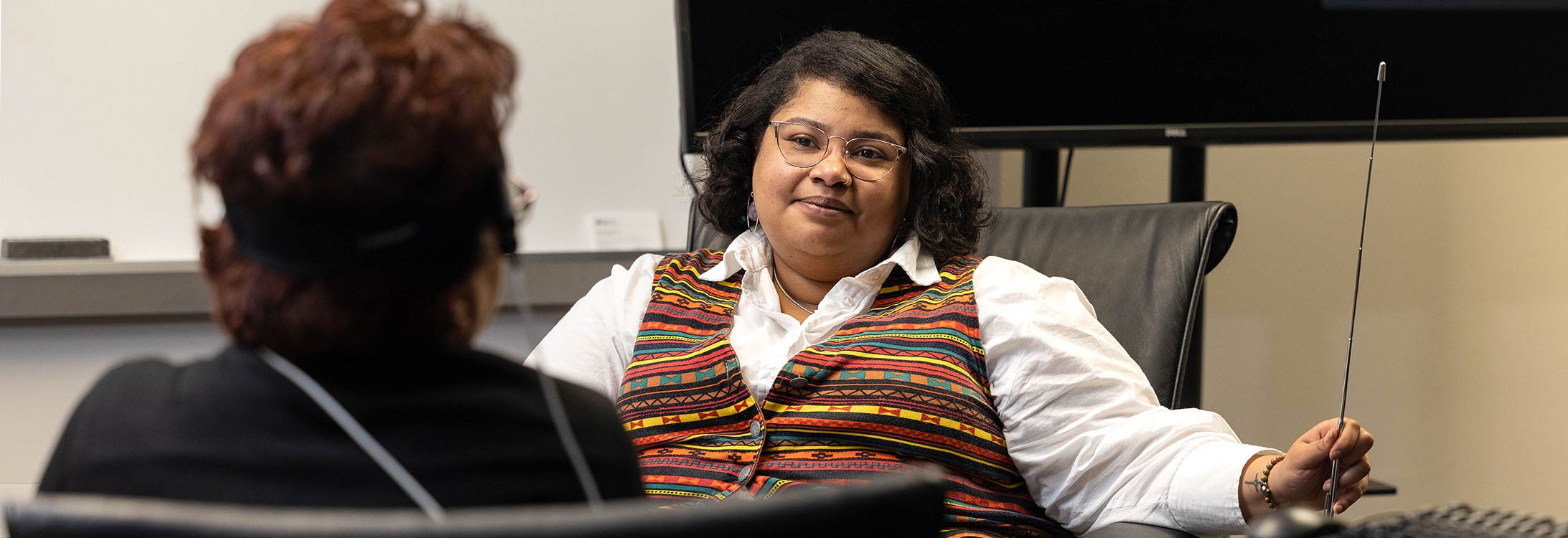MIND-BODY CONNECTION
Brainspotting research, technology broadens counselor education students’ perceptions
As counselor education student Debby Harris filled out career assessments and completed a brainspotting session, sensors on her head measured blood flow in her brain and neural activity.
“Brainspotting is a focused mindfulness session with a trained therapist guides a client to a fixed eye position so they can process unresolved emotional memories, traumatic memories,” said Dr. Meghan Berger, a trained brainspotting therapist. “It can also be used for performance and expanding skills so it’s a really unique therapy that is innovative and new.”

Berger shows mock patient and counselor education student Debby Harris the heart rate and neural activity information collected using the technology in the Neurocognition Science Laboratory.
Berger has melded her interest in brainspotting with her work as a research and teaching fellow in the College of Education at East Carolina University. A small group of students enrolled in her Career Counseling and Development course, which prepares counselors to work with individuals across the lifespan and career concerns, volunteered to serve as mock clients.
Each student completed career assessments and a short mindfulness session using brainspotting therapy while wearing heart rate variability monitors and a functional near-infrared spectroscopy device. The data collected will then be shared with the rest of the class to interpret for their final project.
“My experience was fun and exciting,” Harris said. “I love how technology can peer into our brains and show two lines on a screen and somehow give us insight into that part of our world. It is amazing to me how our brains store all our information from all our experiences, good and bad.”
While Berger has completed many brainspotting sessions in the past, these sessions allowed her to use the technology in ECU’s Neurocognition Science Laboratory to enhance her research and introduce counselor education students to the lab and new technology that can better inform their counseling practice.
“As individuals are empowered or overcoming different work challenges, I hypothesize that brainspotting could be beneficial, but before I get more into my research, I wanted to test and explore what I could do in the lab,” Berger said. “Students in counselor education may not always have access to neuroscience so this focuses on how the brain works with counseling and integrating that with career.”
As Harris’ mock session continued, Berger walked her through the process, explaining what she was doing and its implications. During the brainspotting session, Berger began by asking Harris if there was a word or idea associated with her development and the career assessments, and then asked various questions about how Harris felt and what those feelings meant for her.
“I’m excited that counselors can be trained in this specialty with the hopes that it can help clients heal through this process,” Harris said. “If anyone gets the opportunity to experience brainspotting, I highly recommend it to them.”
According to Berger, she is one of two therapists trained in brainspotting in eastern North Carolina and the only brainspotting therapist at ECU. Her dream is to increase the number of therapists in the region by implementing a training program and professional development opportunities.
“Brainspotting can be used not just in the medical model sense and not just if a person has anxiety or depression but really if a person is going through life concerns, brainspotting can be beneficial,” she said. “I think by pointing it out in this way, it may encourage other clinicians to receive training.”
Berger also hopes that this experience using brainspotting and monitoring technology can broaden her students’ perceptions of the field of counseling.
“I hope to inspire students to seek out trainings that may not be taught in textbooks or seek out opportunities that they are personally passionate about, even though it may not be readily accessible,” she said.
It was, after all, her own passion for neuroscience that brought her to the field of brainspotting. When she was a research assistant exploring microaggressions in STEM settings, she had the opportunity to write her project and chose to tie in neuroscience.
“I created an access for myself,” Berger said. “I would hope that long term, students will see my story and be inspired by that. Whether it’s brainspotting, pet therapy, equine therapy, ecotherapy, or anything else, they can explore for themselves.”
